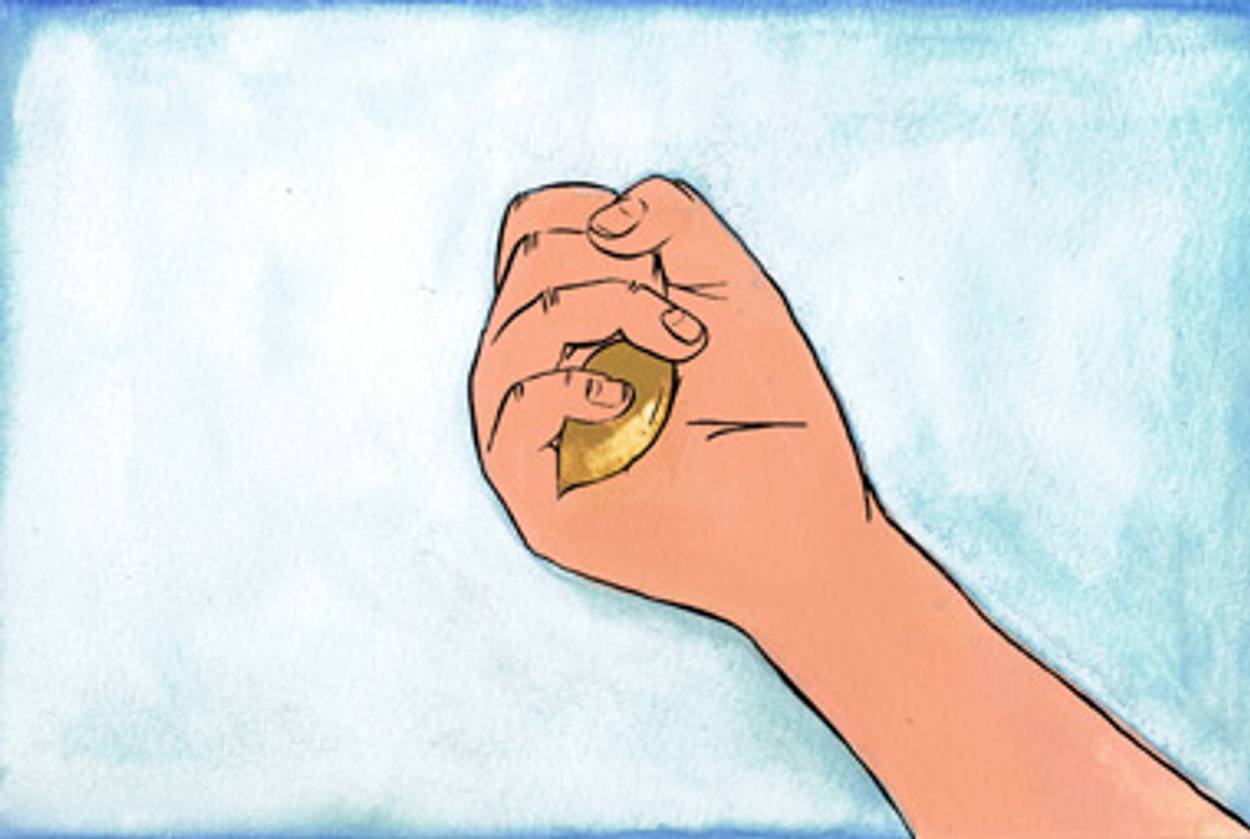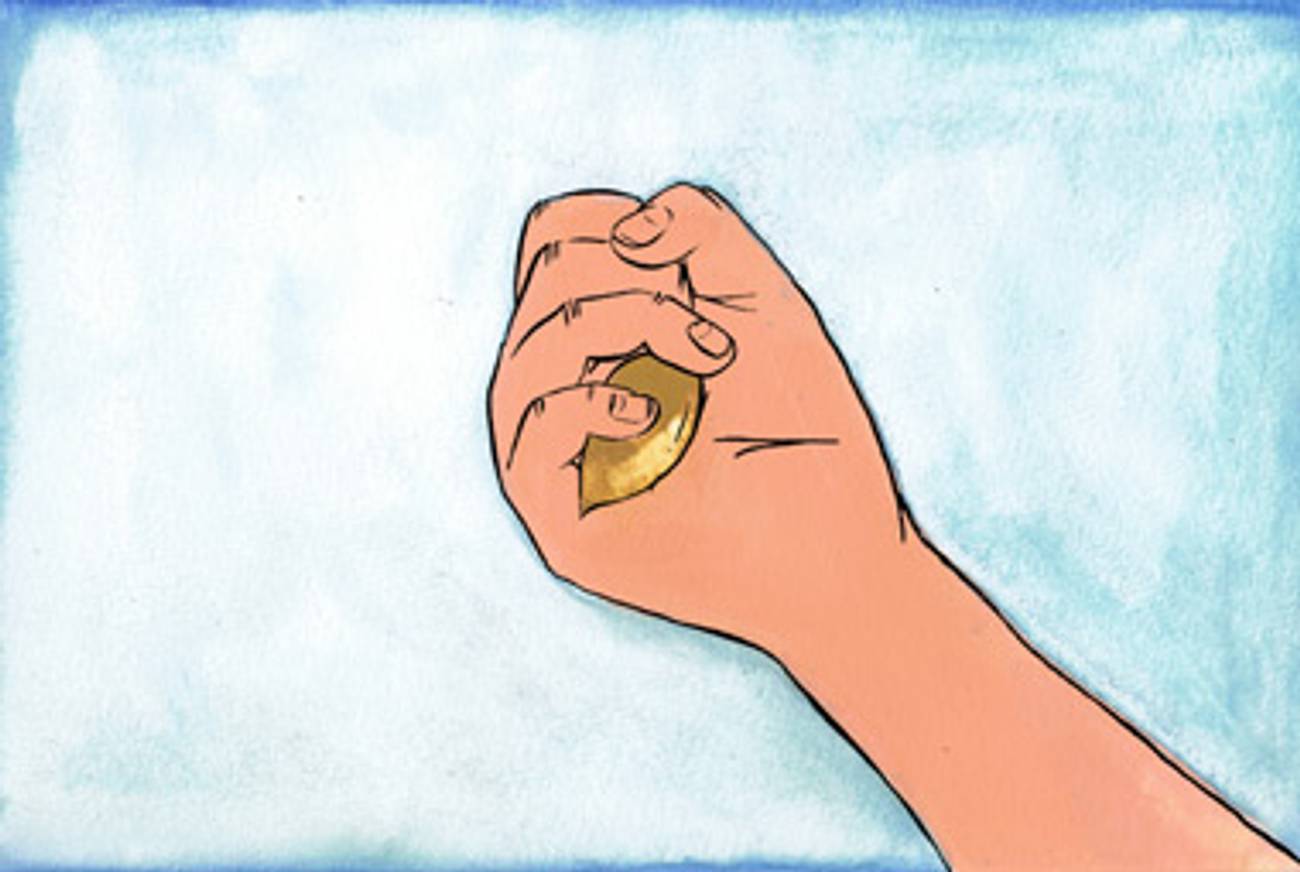Pit Stop
For kids growing up in Israel in the 1970s and 1980s, before cable TV and video games, summer meant apricots and the apricot-pit game called gogoim, mindless child’s play with political overtones




Like one’s youth, like summer itself, apricot season is short and sweet and over too soon. It is now at its peak; it’ll end shortly. But for anyone who grew up in Israel in the late 1970s and early 1980s, the apricot is a throwback to a different world.
This has to do less with the fruit than with the pit. Known in Hebrew as “gogo,” the apricot pit—resilient and shiny!—was the chief object of summer’s entertainment. When June arrived and school let out, we would collect as many of these pits as possible—the plural word is gogoim—and dash outside to play. The rules of the game were simple: You’d dig a hole 6 or 7 feet in the distance, just big enough to snugly contain a single gogo, and then do your best to throw your own precious pits into the hole; the first to succeed collected all the gogoim that fell short of the target.
It sounds simple. It wasn’t. Like everything else in Israel, the game of gogoim was never too far from life’s harsh realities.
For one thing, one could never truly win: Once a game session was over, the winner was obliged by gogoim decorum to toss his precious pits in the air while yelling “Kululushu!” —a beautiful and nonsensical word. Then, we’d all scramble about, collecting the gogoim from the ground. It was a schoolyard version of redistribution of wealth, befitting a nation that, at the time, was still somewhat true to its socialist roots.
It never occurred to us kids, of course, that there was something strange about forfeiting one’s profits. Nor did we realize that by being gogo enthusiasts, we were helping Israel’s then-predominant industry, agriculture. When I was growing up, before the days of the burgeoning software industry and electric cars and the other high-tech fruits of Israeli ingenuity, agriculture made up more than 6 percent of the gross domestic product; today, the number has dropped below 2.5 percent. Our mothers, then, were thrilled to acquiesce to our nagging demands that they buy more, more, and more apricots. The game was not only fun but a Zionist statement as well, helping our farmers thrive, boosting our nation’s economy.
And whenever Zionist sentiments are involved, geopolitics are never far behind. Once we hit third or fourth grade, we kids—by now, expert gogo handlers—started craving new variations on the game. The most popular mutation had us placing all of our gogoim save for one in a larger hole, and then throwing our sole gogo into the hole as hard as we could in an effort to cause as many pits as possible to come flying out. We needed a name for this enterprise, something that would capture its brutality, its mindlessness, its sense of raw power. We were Israeli kids, and above the blackboard in our classroom hung Joseph Trumpeldor’s famous last words: “It is good to die for one’s country.” We called our new game “Arab hole.”
But our thirst for nomenclature transcended our racism. Even as we busily played, we were well aware that in a few weeks’ time, apricots would go away and with them our gogoim, and we’d be back in school and back with less magical games, like soccer, which we loved but which it was much too hot to in the summer to play. Arabic provided just the proverb we needed to express our appreciation for this fruity, fleeting wonder of ours: Bukra fil mishmish, which translates roughly as “tomorrow, when the apricots bloom,” and which we took to mean something like “tomorrow is another day.”
Tomorrow, as it turned out, was just that: By the time I started junior high, the first Atari video game consoles made their way to Israel en masse, and kids just three or four years younger than me started spending summers fending off space invaders. And television—in my day, a single-channeled enterprise that offered us young drab educational programming and third-rate American detritus from the 1960s—blossomed into a medium in full. Apricots were abandoned, their pits unplayed.
I’ve moved on, too. I now have a doctorate in video games, which means I spend a lot of time playing with electronics. I live in Manhattan, where there are few places to dig holes. But every summer come the apricots, and with them, the memories.
Liel Leibovitz is a senior writer for Tablet Magazine and a host of the Unorthodox podcast.
Liel Leibovitz is editor-at-large for Tablet Magazine and a host of its weekly culture podcast Unorthodox and daily Talmud podcast Take One. He is the editor of Zionism: The Tablet Guide.